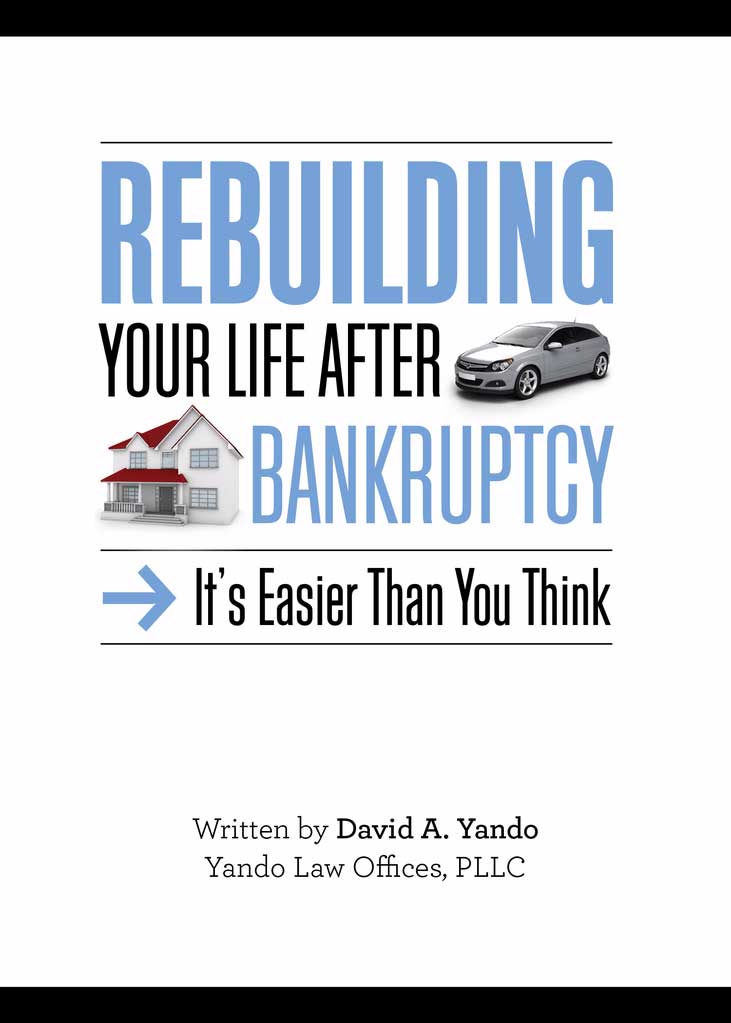What Types of Debt are Eliminated by Bankruptcy
Personalized Counsel from a Pierce County and Tacoma Bankruptcy Lawyer
Accumulated debt and threats of foreclosure can make bankruptcy look like an appealing option, particularly when you feel like there is nowhere left to turn. It is important to note, however, that bankruptcy doesn’t eliminate all debt. Whether you file for Chapter 7 or Chapter 13, you should know what you’ll be left with after it’s all said and done.
For more than 30 years, bankruptcy attorney David Yando has been serving the community as a skilled Tacoma bankruptcy lawyer. He understands the complexities involved and can address your concerns while working to give you a better financial future.
What debt can Chapter 7 & Chapter 13 eliminate?
One of the biggest forms of debt taken care of in both Chapter 7 and Chapter 13 bankruptcy is credit card debt. A credit card’s remaining balance is considered unsecured debt, and collection accounts usually are treated as unsecured. If you are making payments on a home or a vehicle, those are considered secured debts that must continue to be paid if you want to keep the collateral.
Along with credit card debt, Chapter 7 also discharges many other forms of debt, including:
- Medical bills
- Personal loans
- Utility bills
- Business debts
- Car accident claims
Not all debts are discharged. The debts discharged vary under each chapter of the Bankruptcy Code. Section 523(a) of the Code specifically excepts various categories of debts from the discharge granted to individual debtors. Therefore, the debtor must still repay those debts after bankruptcy. Congress has determined that these types of debts are not dischargeable for public policy reasons (based either on the nature of the debt or the fact that the debts were incurred due to improper behavior of the debtor, such as the debtor’s drunken driving).
There are 19 categories of debt excepted from discharge under chapter 7, while a more limited list of exceptions applies to cases under chapter 13.
Generally speaking, the exceptions to discharge apply automatically if the language prescribed by section 523(a) applies. The most common types of nondischargeable debts are certain types of tax claims, debts not set forth by the debtor on the lists and schedules the debtor must file with the court, debts for spousal or child support or alimony, debts for willful and malicious injuries to person or property, court fines and penalties, debts for most government funded or guaranteed educational loans or benefit overpayments, debts for personal injury caused by the debtor’s operation of a motor vehicle while intoxicated, debts owed to certain tax-advantaged retirement plans, and debts for certain condominium or cooperative housing fees.
The types of debts described in sections 523(a)(2), (4), and (6) (obligations affected by fraud or maliciousness) are not automatically excepted from discharge. Creditors must ask the court to determine that these debts are excepted from discharge. In the absence of an affirmative request by the creditor and the granting of the request by the court, the types of debts set out in sections 523(a)(2), (4), and (6) will be discharged.
A slightly broader discharge of debts is available to a debtor in a chapter 13 case than in a chapter 7 case. Debts dischargeable in a chapter 13, but not in chapter 7, include debts for willful and malicious injury to property, debts incurred to pay non-dischargeable tax obligations, and debts arising from property settlements in divorce or separation proceedings. Although a chapter 13 debtor generally receives a discharge only after completing all payments required by the court-approved (i.e., “confirmed”) repayment plan, there are some limited circumstances under which the debtor may request the court to grant a “hardship discharge” even though the debtor has failed to complete plan payments. Such a discharge is available only to a debtor whose failure to complete plan payments is due to circumstances beyond the debtor’s control. The scope of a chapter 13 “hardship discharge” is similar to that in a chapter 7 case with regard to the types of debts that are excepted from the discharge.
Contact a Pierce County Bankruptcy Attorney Today!
You should not have to live with fear over the state of your finances. Don’t wait to pursue debt relief – contact Washington Fresh Start today!

